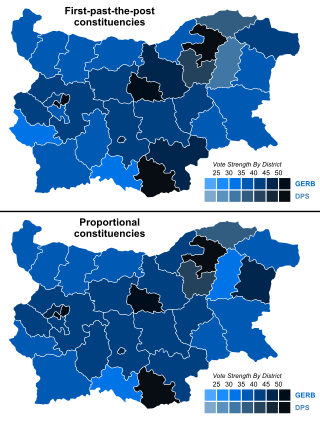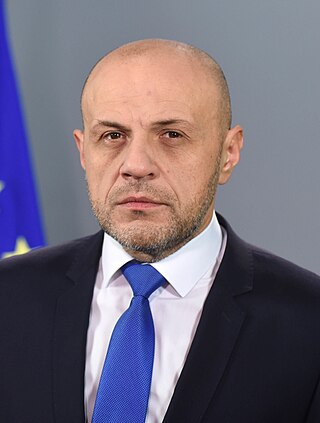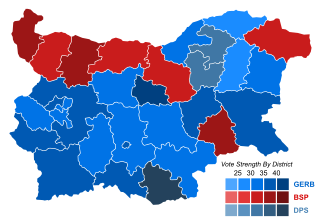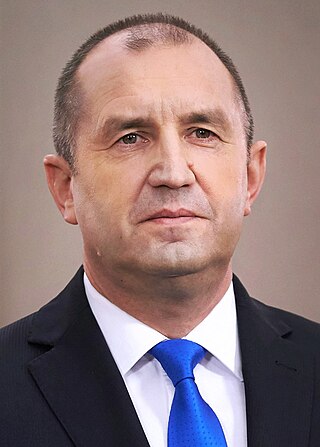
The politics of Bulgaria take place in a framework of a parliamentary representative democratic republic, whereby the prime minister is the head of government, and of a multi-party system. Executive power is exercised by the government. Legislative power is vested in both the government and the National Assembly. The Judiciary is independent of the executive and the legislature.

The Bulgarian Socialist Party (BSP), also known as The Centenarian, is a centre-left, social democratic political party in Bulgaria. The BSP is a member of the Socialist International, Party of European Socialists, and Progressive Alliance. Although founded in 1990 in its modern form, it traces its political heritage back to the founding of the BRSDP in 1891. It is also Bulgaria's largest party by membership numbers.

The Movement for Rights and Freedoms is a centrist political party in Bulgaria with a support base among ethnic minority communities. It was a member of the Liberal International and the Alliance of Liberals and Democrats for Europe (ALDE). While representing the interests of Muslims, especially Turks and to a lesser extent Pomaks, the party also receives the largest share of Romani votes.

Sergey Dmitrievich Stanishev is a Bulgarian politician who served Prime Minister of Bulgaria from 2005 to 2009. A member of the Socialist Party, which he led from 2001 to 2014, he later served as Member of the European Parliament from 2014 to 2024. Stanishev was also the President of the European Socialists from 2011 to 2022 and a Member of the National Assembly from 1997 to 2005 and from 2009 to 2014.
The history of Bulgaria from 1990 to the present is the period of Bulgarian history that begins after the fall of Communism and the transition to a market economy.

The eighty-ninth cabinet of Bulgaria, also known as the Three-party coalition cabinet and the Stanishev Government, ruled from August 17, 2005, to July 27, 2009. The cabinet was formed with the coalition of the three leading at that time: BSP, NDSV and DPS, in order of their parliamentary representation. Their parliamentary representation also determined the number of cabinet appointments.

Parliamentary elections were held in Bulgaria on 5 July 2009. With 40% of the vote, the decisive winner of the elections was the established in 2006 personalistic party of Boyko Borisov, GERB. The Socialist Party, in power before the election, was in second place, with around 18%. Оnce-ruling National Movement Simeon II did not cross the 4% threshold and won no seats. The turnout was 60.6%, one of the lowest ever. Following the election, GERB leader Boyko Borisov became prime minister. Just like all the previous parliamentary elections since the fall of communism, the government was not re-elected.

Rosen Asenov Plevneliev is a Bulgarian politician who served as the 4th President of Bulgaria from 2012 to 2017. Affiliated with the GERB party, he previously served as Minister of Regional Development and Public Works from 2009 to 2011.

Parliamentary elections were held in Bulgaria on 12 May 2013, two months ahead of schedule. Protests had forced the resignation of the GERB government in February, leading to the election being moved up.

An election of the Members of the European Parliament from Bulgaria to the European Parliament was held on 25 May 2014 as part of the larger European Parliament election. After a decision by the European Council in 2013, Bulgaria was allocated 17 seats in the European Parliament for the Eighth European Parliament.

Plamen Vasilev Oresharski is a Bulgarian politician who served as Prime Minister of Bulgaria from 2013 to 2016. Affiliated with the Bulgarian Socialist Party, he previously served as Member of the National Assembly from 2009 to 2013, Minister of Finance from 2005 to 2009 and Deputy Minister of Finance from 1997 to 2001.

From mid-2013 to mid-2014, a series of demonstrations were held in Bulgaria, mainly in the capital Sofia, against the left-wing coalition cabinet of Oresharski. The demonstrations started on 28 May 2013, but actual large-scale protests did not emerge until 14 June.

Mihail Raykov Mikov is a Bulgarian politician who was Chairman of the Bulgarian Socialist Party (BSP) from 2014 to 2016. He is a parliamentarian with six consecutive terms as a deputy in the National Assembly. His career in the legislature culminated in his election as Chairman of the 42nd National Assembly on May 21, 2013. Mikov was Minister of Interior from 24 April 2008 to 29 July 2009 in Sergei Stanishev's government. Currently he is the leader of the Parliamentary Group of BSP Left Bulgaria in the 43rd National Assembly, the coalition led by the socialist party. Mihail Mikov was elected as Chairman of the BSP on 27 July 2014, succeeding Sergei Stanishev. He won a run-off against outgoing Economy and Energy Minister Dragomir Stoynev with a final tally of 377-333.
The Oresharski Government was the ninety-second cabinet of Bulgaria which took office on 29 May 2013. The government, led by Prime Minister Plamen Oresharski, is one of technocrats created following the 2013 election. The cabinet was dissolved on 6 August 2014 to make way for a caretaker government that would lead Bulgaria through early elections in October of the same year.

The ninety-fourth Cabinet of Bulgaria took office on November 7, 2014. It was a coalition government chaired by Boyko Borisov. The government was formed after Borisov's party, GERB, won the 2014 parliamentary election. As GERB won 84 out of the 240 seats in the National Assembly, they were compelled to form a coalition to legally govern.

Parliamentary elections were held in Bulgaria on 26 March 2017. They had originally been scheduled for 2018 at the end of the four-year term of the National Assembly. However, following the resignation of Prime Minister Boyko Borisov and the failure of Bulgarian parties to form a government, early elections were called. Borisov resigned following the defeat of Tsetska Tsacheva, the candidate of his GERB party, in the November 2016 presidential elections. The official election campaign began on 24 February.

General elections were held in Bulgaria on 14 November 2021 to elect both the President and the National Assembly. They were the country's third parliamentary elections in 2021, with no party able to form a government after the elections in April and July. A second round of the presidential elections were held on 21 November 2021 as no candidate was able to receive a majority of the vote in the first round.
We Continue the Change, sometimes translated as Change Continues, is a centrist, anti-corruption political party and formerly an electoral alliance in Bulgaria led by Kiril Petkov and Asen Vasilev, two former caretaker ministers. It was founded ahead of the November 2021 election. The party was officially registered on 15 April.

Early parliamentary elections were held in Bulgaria on 2 April 2023 to elect members of the National Assembly. These were initially scheduled to be held before November 2026; however, as no government was approved by the 48th Parliament, Bulgarian President Rumen Radev announced in January 2023 that he would call a snap election.

The Bulgarian political crisis is a period of instability in Bulgaria, which has seen the country face seven parliamentary elections over four years: April 2021, July 2021, November 2021, October 2022, April 2023, June 2024 and October 2024.




















